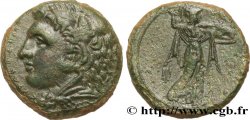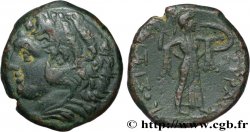bgr_483967 - SICILE - SYRACUSE Litra
недоступный.
Товар уже продан в нашем интернет-магазине (2021)
Цена: : 350.00 €
Товар уже продан в нашем интернет-магазине (2021)
Цена: : 350.00 €
Тип Litra
Дата: c. 278-276 AC.
Монетный двор / Город: Syracuse, Sicile
Металл: bronze
Диаметр: 25 mm
Ориентация осей монеты: 12 h.
Вес: 11,43 g.
Редкость: R2
Комментарии о состоянии
Exemplaire sur un flan bien centré des deux côtés. Belle tête imberbe d’Héraklès au droit avec une faiblesse de frappe sur la légende. Joli revers de style fin. Très belle patine vert foncé épaisse
Ссылки в каталоге: :
Происхождение:
Cet exemplaire provient du stock de Neumann et de la collection Laurent F
Лицевая сторона
Аверс: описание: Tête imberbe d’Héraklès (Hercule) à gauche, coiffée de la léonté, nouée sous le cou ; derrière la tête, une massue ; grènetis circulaire.
Аверс: легенда: SURAKOSIWN.
Аверс: перевод: (Syracuse).
Обратная сторона
Реверс: легенда: ANÉPIGRAPHE.
Реверс: Описание: Athéna Promachos (Minerve victorieuse) marchant debout à droite, brandissant le foudre de la main droite et tenant un bouclier de la main gauche, l’égide tombant de l’épaule ; dans le champ à gauche, un foudre posé verticalement.
Комментарий
Pour ce type, nous avons deux types bien différents. Au revers, la représentation d’Athéna Promachos fait penser à une statue cultuelle de la déesse qui pouvait être transportée. Ce type est beaucoup plus rare que ne le laissent supposer les ouvrages généraux.








 Cообщить об ошибке
Cообщить об ошибке Распечатать страницу
Распечатать страницу Отправить мой выбор
Отправить мой выбор Задать вопрос
Задать вопрос Consign / sell
Consign / sell
 Информация
Информация



